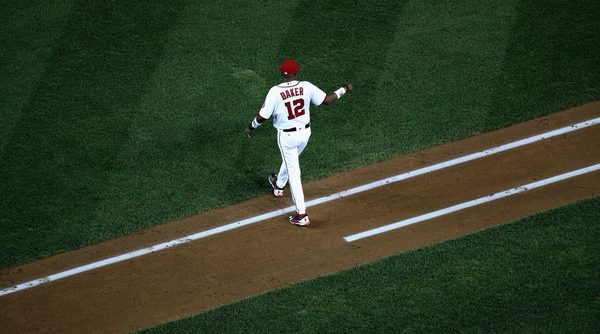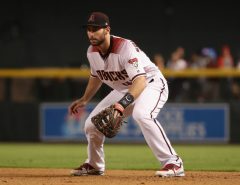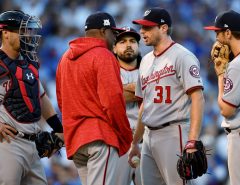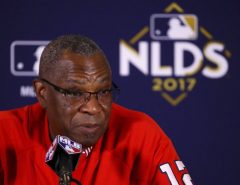I have tried to ignore it for days but it is time the address the elephant in the room — or in this case, the dumpster fire in the room. I am, of course, referring to the Los Angeles Dodgers and their increasingly slim lead for the best record in baseball. An 11-game losing streak and only twos win in September through 13 days of the month have created a gaping opportunity for the Washington Nationals to overtake them for home field advantage. This, along with very little else exciting happening for Nats fans, has created a storm of hot takes surrounding the merits of earning the top overall seed. I have considered all sides of this and have finally come to a definitive conclusion: being the top seed is good.
This is not a statistical-based opinion in the sense that the odds of advancing are higher or lower based on being the top seed. To me, this is just common sense. The support behind wanting to finish second is a reasonable one: The Diamondbacks and Rockies have looked far better and been more consistent than any of the NL Central teams this year. Also, playing a five-game series with two in Colorado makes it even more of a coin flip, and the Diamondbacks have the only offense that really rivals Washington’s. With all of that said, the advantage to finishing first is still too great to reasonably say that it isn’t the preferable option.
The most preferred option for the Nationals, just based on talent, is to finish second and have the Cardinals win the Central, but I don’t see that happening. Like it or not, the Cubs are going to win the Central. That leaves the Nationals with two likely scenarios: three home games against either Chicago or against the winner of Colorado and Arizona. Chicago has struggled to establish any consistency in their title defense year, but that’s the thing: they won the World Series. This team never melted down under pressure like Washington has, and the Cubs returned essentially every player from that team. Further, as much as I love Dusty Baker, the Cubs are the only team in the National League with a clear managerial advantage. The effect of that varies, but we saw Matt Williams get consistently outmanaged the last time Washington faced a Hall of Fame caliber manager in the postseason.
More importantly than who is standing at the top step is who will be on the mound. The advantage of facing the Wild Card team after they use their top starter cannot be understated. If the Diamondbacks win the Wild Card, they will almost certainly have pitched Zach Greinke; if it is the Rockies, well, they have no clear ace but Kyle Freeland would be my pick to pitch a winner-take-all game. Either way, the Wild Card pitcher will not be available on full rest until Game 3. Essentially unavailable the rest of the series, any Wild Card team’s best starter will have far less impact on a series than the ace of the league’s top seed. That advantage does not exist whatsoever for the second seed.
The next area to look at is general team composition. The Cubs have a strong rotation, especially the top three. Jon Lester, Jose Quintana, and Jake Arrieta are a relatively good match for Max Scherzer, Stephen Strasburg, and Gio Gonzalez. While underachieving much of the year, their offense is deep and experienced and could be as good or better than Washington’s depending on the health of Bryce Harper. The Diamondbacks offer essentially as good of a team, perhaps better. Their rotation of Greinke, Robbie Ray, Zack Godley, and Taijuan Walker is deeper than any NL team, leaving them with a near certain advantage in the fourth starter spot. An offense featuring Paul Goldschmidt and J.D. Martinez plus a score of underrated position players make them a scary opponent.
Believe me, I completely understand why so many Nats fans want to miss these guys. The reality is, the MLB postseason is such a tossup that the only way to look at it is by maximum value. That is, what is most likely. While the Diamondbacks are possibly the scariest team in the NL these days, they are hardly more than a 50/50 favorite to even make it to the NLDS. Crazy things happen in the Wild Card game. The potential to face a team like the Rockies, who no matter how you look at it are inferior to both the Cubs and Diamondbacks, is worth the top seed. Does this mean the Rockies are a pushover? Of course not. They belong in the playoffs and are better than three quarters of Major League teams. Like I said, this is about maximizing opportunity and giving your team the best possible odds of winning. In the unlikely event that the Dodgers’ collapse continues to the point that they surrender the top seed in the National League, welcome it with open arms. The best odds to get the first-round monkey off their back come from the advantages of the number one seed.
Tags: Nationals, Nats, Washington Nationals




All correct with regards to the NLDS, and that’s without even considering home-field advantage in the NLCS (if v the Dodgers) or indeed the World Series (where we are currently 1.0 ahead of Houston and 1.5 back of Cleveland).
Being the top seed is indeed good.
I think Edwin Jackson is a bad choice as part of the 25 man roster. He is not dependable against great hitting and he is in what I believe is a serious downward slide, with too much plate and too many walks and three ball counts. I would go with Emmy as he seems healthy. If not I would go outside the box and keep Robales as he is special and I recall this guy named Harper who played at 19!